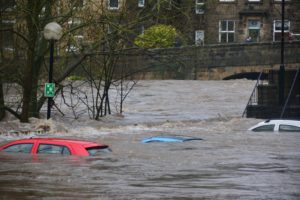 Everyone in Georgia knows just how powerful and destructive floods can be. They are difficult to predict and many of us are in the workplace when they hit—making it essential that we are prepared and know the proper steps to take. Floods can occur from mudslides, the rising river, a damn overflow—or even just a large accumulation of rain. Workers that have to respond to floods have a hazardous job and are at significant risk of getting hurt. It is critical that employers and employees alike have a plan to protect themselves and others in the event of a flood.
Everyone in Georgia knows just how powerful and destructive floods can be. They are difficult to predict and many of us are in the workplace when they hit—making it essential that we are prepared and know the proper steps to take. Floods can occur from mudslides, the rising river, a damn overflow—or even just a large accumulation of rain. Workers that have to respond to floods have a hazardous job and are at significant risk of getting hurt. It is critical that employers and employees alike have a plan to protect themselves and others in the event of a flood.
The following are some common dangers to be aware of if you are working near floodwaters:
1. Driving in a flood.
Don’t make the assumption you can drive through floodwaters, because more than likely you can’t. It only takes one foot of water for a vehicle to start floating. The National Weather Service warns never to drive across a flooded road and encourages people to follow one simple rule: If you can’t see the line markings on the road then it is not safe to drive through it. Your car can be swept away in an instant by rushing waters. And that rule applies to every type of vehicle no matter their size or shape. A large SUV is no more protected by their size then any vehicle and it is statistically just as dangerous as any smaller car.
If you are unfortunate enough to get trapped in a vehicle during a flood, the best thing to do is stay put until help arrives. However, if the water starts to fill the cabin of the vehicle, then try to get to the roof for safety.
2. Being Electrocuted.
The water from a flood will reach electrical circuits at some point, so you want to make sure to turn off all main outlets. If you see a fallen cable or wire, avoid it. You should never use electric appliances or touch electric wires, switches or fuses when you’re wet or when you’re standing in water. And never touch anything plugged into an outlet. Also, don’t think that just because the power went out that you are safe from being electrocuted. Even if you’ve lost power, you can still be electrocuted in a flooded area if someone is running a generator nearby which would back-feed electricity into the grid.
3. Illness and Disease.
Floods can potentially increase the transmission of water-born diseases like Typhoid Fever and Vector-borne diseases like West Nile Fever. If you are a worker that will be in floodwaters, you want to try to avoid direct contact with the water but to also always be wearing appropriate PPE and clothing. Wearing electrically insulated, watertight boots can help prevent the floodwater from touching you and will also help prevent punctures or bites that you might otherwise endure if wearing tennis shoes. Make sure to also wear heavy work gloves to protect your hands, goggles to protect your eyes, and a type of protective hat to protect your head. In any instance, workers must wash their hands with soap and clean before eating and drinking to avoid contamination.
4. Carbon Monoxide Poison.
Floods often cause power outages, which requires the use of an alternative source for fuel and electricity. Using an alternative sources such as a gas-powered generator or propane stove will release carbon monoxide, a deadly, colorless, odorless gas. The most common symptoms of CO poisoning are headache, dizziness, weakness, nausea, vomiting, chest pain, and altered mental status. It is essential that you only use devices that release CO2 in open spaces.
Tips for employers to provide a safe workplace during a flood:
- Make sure to have your employees trained in preparation and evacuation plans.
- Make sure to have all first aid kits stocked.
- Stock up on non-perishable items, such as bottled water and cans of soup.
- Have flashlights with fresh batteries placed in multiple areas of the building.
- Turn off power to prevent electrocution if water should begin to rise.
- Make sure to move to higher ground as water begins to rise.
- Steer clear of all electrical wires and outlets.
- Never drive into the flooded areas.
- Watched for downed trees and always wear protective gloves.
- Be careful not to improperly lift while cleaning up.
Workers Compensation
Employees that are injured at work during a natural disaster or while doing disaster relief are covered by the same benefits traditional workers’ comp provides. In other words, the same basic rules apply. If you have any questions regarding an injury you received during a flood or other disaster situation, reach out to a local workers’ compensation attorney to make sure understand your rights and get the benefits you deserve.
